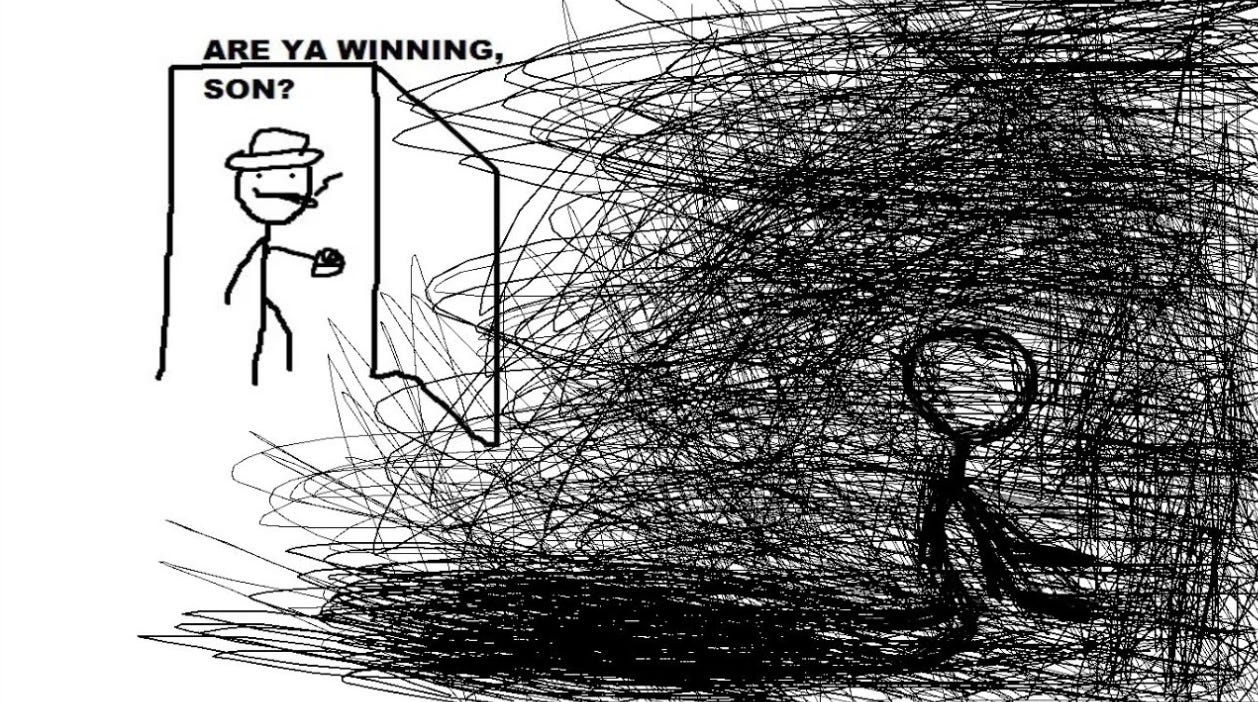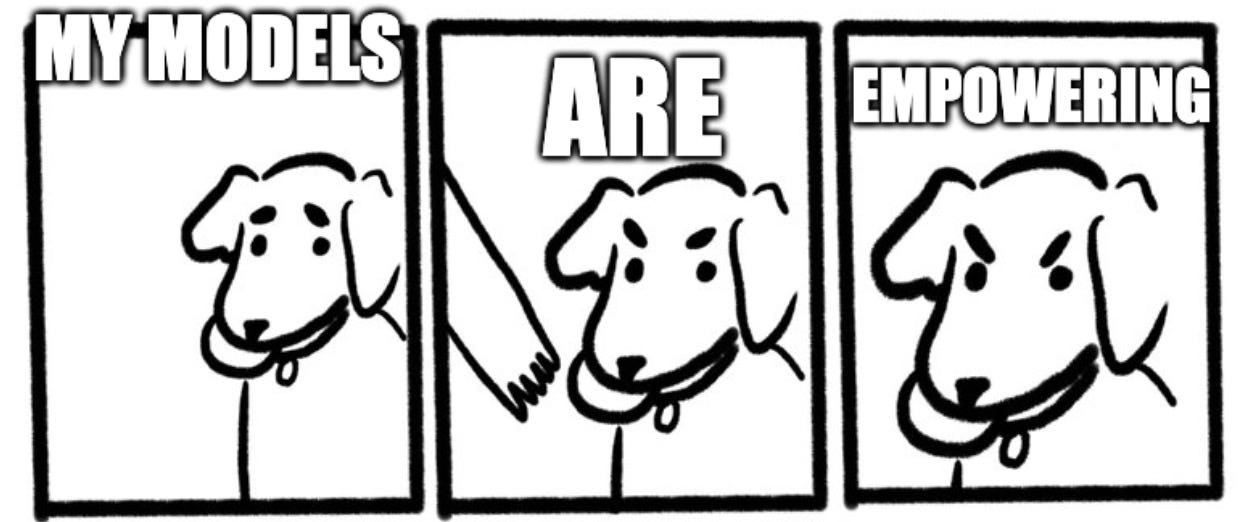Imagine two people climbing a mountain at dawn.
The first—let's call him Mind-Hoarder Me from five years ago—carries an enormous backpack. At every viewpoint, he stuffs another rock into his pack: "This concept explains narcissism perfectly!" Into the bag it goes. "This framework revolutionizes habit formation!" Another rock. "This theory of consciousness connects quantum physics with neuroscience!" The heaviest boulder yet.
By mid-mountain, he's hunched over, breathing shallow, steps unsteady. The interesting ideas that once energized him now make his back ache. “I’m gonna need a bigger backpack and a sherpa, he thinks to himself” He continues collecting, convinced the next viewpoint will reveal the ultimate rock—the one insight that makes sense of all others.
The second climber—who I'm slowly becoming—carries only the essentials. At each landmark, instead of adding, she removes something. She holds each item up, starting with the heaviest rock and working herself down to the smallest, asking: "When and why did I put it here?" When she lets go of something, her posture straightens, her breath deepens, and her perspective of the mountain expands.
Both are climbing, but they're transforming in fundamentally different directions.
We need climbing shoes and basic gear - but at a certain point - a lighter load makes it easier to climb the highest mountains
Knowledge That Weighs vs. Knowledge That Frees
I spent a decade confusing two distinct forms of understanding:
Interesting knowledge expands horizontally—it adds more content, more complexity, more intellectual furniture to an already cluttered room. It makes you interesting at dinner parties but doesn't necessarily improve your own or other peoples life.
Expansive knowledge grows vertically through “aha moments”—it creates space by making you lighter. It often feels like a revelation as it makes you lighter.
For years, my only criterion for what deserved my attention was whether it fascinated me. I collected intellectual souvenirs like a tourist with knee socks.
The result? A mind so crowded with interesting ideas that I could barely move through it.
The Body Knows Before the Mind Admits It
Your body recognizes the difference between these two types of knowledge:
After consuming an exclusively interesting knowledge diet, you feel intellectually stimulated but tired—like you're always one more book, article, or course away from the answer.
After experiencing expansive knowledge, you feel a physical unburdening, an aha moment, and you breathe easier.

The Antimatter Effect
Here's the beautiful paradox—when you let go of interesting knowledge, you don't actually lose the wisdom. Instead, it transforms into what I call "antimatter understanding" (seriously, we need a better name for this).
When you first learn something, it adds weight to your intellectual pack. When you unlearn it through direct experience, that weight dissolves, but the essence remains as a lighter, more refined comprehension.
It's like the difference between:
Carrying a 100-page manual on how to swim
The embodied knowledge of swimming that requires no thought at all
One weighs you down; the other sets you free.
This light knowledge is the best kind of knowledge. It's fluid, not fixed. Each time you access it, you naturally express it in novel ways tailored to the situation. If you grow and come back to the knowlege it will have grown because you have grown. It's not memorized or recited and it grows with you—you're not anxious about forgetting it because it's become part of you.
Think about how you explain swimming to different people: to a fearful child, a competitive athlete, or an elderly person trying it for the first time. You don't regurgitate the same explanations from your mental manual—you spontaneously generate the perfect explanation for that person. That's light knowledge at work. It's the ultimate compression algorithm for wisdom.
It's what Einstein hinted at when he said that if you truly understand something, you can explain it to a five-year-old. Not because you've memorized a simplified version, but because you comprehend it so deeply that you can generate any version needed on the fly.
Heavy knowledge makes you sound smart at dinner parties. Light knowledge helps you navigate life with ease. Which would you rather carry up the mountain?
Breaking the Intellectual's Addiction
If you're like former me—smart but still unhappy, knowledgeable but still stuck—you may be caught in the loop of horizontal accumulation without vertical release.
The cure isn't more interesting knowledge. It's direct experience that allows you to transcend and include what you already know.
Three practices that helped me break this pattern:
Body scanning: When encountering new information, check your physical response. If information makes you tired then don’t consume it. It’s like eating a happy meal that don’t make you happy after eating it.
Direct experience: I cannot recommend Vipassana meditation strongly enough. It's the intellectual's detox—a practical, non-dogmatic way to directly experience "expansive" knowledge.
Vipassana retreats are completely free (including food and accommodation):
Visit Dhamma.org
Click "Courses"
Choose any 10-day course
Apply and prepare to work super hard. (It’s not hard, but it’s hard work)
After my first 10-day retreat…. Well. It felt like I could finally breathe again. I stopped intellectualizing my experience and started living it. Vipassana Vipassana vipassana ViPaaSSaNA. Hahaha now you will remember vipassana.
Vipassana, meaning "to see things as they really are," is one of India's most ancient meditation techniques. It's the original meditation method taught by the Buddha, entirely free from dogma. Preserved meticulously through an unbroken chain of over 50 teachers in Burma, Vipassana remained pure and undiluted—even as it evolved into Buddhism elsewhere. Today, this pristine form of meditation is making its way back into the mainstream and can be learned by anyone in just 10 days.
and I hear you thinking “me? meditation? NO.”
I get it. I really do. For years I thought meditation was for people who didn't have enough interesting thoughts of their own. “Why would I—intellectual extraordinaire with enough fascinating ideas to fill the Library of Alexandria—deliberately practice not….thinking?”
To prove my point why do we know about the library of Alexandria like wtf why do we know about a library that burned down -that shows how knowlege obsessed we are
The Painful Truth About Smart People
Nobody told me this as a young intellectual, so I'll tell you: Your intelligence can become your greatest barrier to wisdom and heaviest load to carry. Especially if you are the smart person in your circle - which you most likely are. People give us credit for being smart, it may turn into our livelihood (social or material) and we double down into intelectualism.
Smart people, me included fall in love with our mental models and confuse them for actual reality. We become like scientists who prefer their theories over experimental results. When life contradicts our models, we look around to see if someone is looking - and then we change the hypothesis.
The path forward isn't adding more complexity—it's seeing reality for what it is. The point of the map is to graduate the map. I confused the map for reality and was stumbling on the sidewalk with the map in my face. I had to suffer through complexity to appreciate simplicity - and maybe you also had to do that. Maybe you are still suffering in complexity - thinking that more complexity will lead you to find truth.
From Information to Transformation
The most profound shift happens when you stop treating knowledge as something to accumulate and start seeing it as something to embody. What’s the point of calories that can’t turn into muscles?
Instead of asking: "What new information can I gather today?"
Ask yourself: "When can I go to my first Vipassana retreat?"
Because the freedom you're seeking isn't found in knowing more
Maybe there’s some real a wisdom in that man that knows nothing → so then why are you still chasing things to know- when you already know so much?
Maybe there’s wisdom in “just do it”
Did I just read an ad for vipassana meditation?






